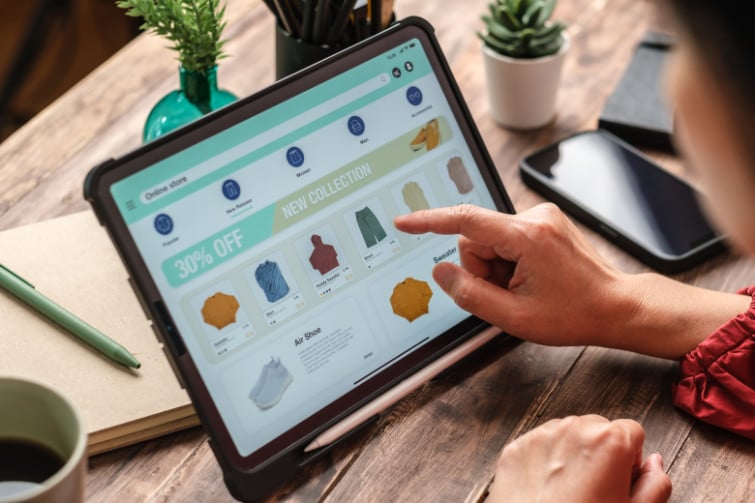The future of e-commerce is poised for transformative changes, driven by the rapid evolution of technology. As digital commerce continues to grow, emerging technologies like Augmented Reality (AR), Virtual Reality (VR), blockchain, and the Internet of Things (IoT) are set to redefine the online shopping experience. This blog post explores how these technologies will shape the future of e-commerce, enhancing customer engagement, streamlining operations, and ensuring security and trust.
Augmented Reality (AR) and Virtual Reality (VR)
AR and VR technologies are at the forefront of revolutionising the online shopping experience. They offer immersive experiences that bridge the gap between physical and digital retail spaces. AR allows customers to visualise products in their own environment before making a purchase. For instance, furniture retailers like IKEA have already implemented AR apps that enable customers to see how a piece of furniture would fit and look in their own homes. This not only enhances the shopping experience but also reduces the likelihood of returns, a significant challenge in e-commerce.
VR takes this immersion a step further by creating a completely virtual shopping environment. Imagine donning a VR headset and walking through a virtual store, picking up items, examining them from every angle, and even trying on clothes virtually. This level of interaction can dramatically increase engagement and customer satisfaction, providing a shopping experience that rivals, or in some cases, surpasses physical retail.
Blockchain
Blockchain technology, best known for its role in cryptocurrencies, offers promising applications in e-commerce, particularly in enhancing transparency, security, and trust. Blockchain can secure transactions, reduce fraud, and ensure the authenticity of products. For high-value items like luxury goods, art, or collectibles, blockchain can provide a tamper-proof provenance record, ensuring buyers receive genuine products.
Furthermore, blockchain can streamline supply chain management, making it more transparent and efficient. By recording every transaction in a decentralised ledger, all parties in the supply chain can track the movement of goods in real time, reducing losses and improving inventory management. This increased transparency and efficiency could lead to cost savings for both retailers and consumers.
Internet of Things (IoT)
The IoT is connecting everyday objects to the internet, turning them into sources of data and interaction. In e-commerce, IoT can enhance the shopping experience, improve logistics, and provide personalised marketing. Smart devices can collect data on consumer habits and preferences, enabling businesses to offer personalised recommendations and services. For example, smart refrigerators can track consumption patterns and automatically reorder groceries when supplies run low, integrating seamlessly with online grocery services.
On the logistics side, IoT devices can monitor the condition and location of goods in transit, ensuring their integrity and timely delivery. This is particularly important for perishable or sensitive products, where maintaining specific conditions is crucial. IoT technology can also optimise warehouse operations, using sensors and automation to streamline inventory management.
Personalization and Customer Experience
The convergence of AR, VR, blockchain, and IoT technologies will enable unprecedented levels of personalisation in e-commerce. By leveraging data from these technologies, businesses can create highly personalised shopping experiences, tailoring product recommendations, marketing messages, and even the shopping environment to individual preferences. This level of personalisation can significantly enhance customer satisfaction and loyalty, driving sales and repeat business.
Security and Privacy
While these technologies offer significant benefits, they also raise important security and privacy concerns. The collection and use of personal data must be handled with utmost care to protect consumer privacy. Blockchain can play a key role here, providing secure and transparent mechanisms for managing data. However, businesses must also adhere to privacy regulations and ensure that their use of these technologies does not infringe on consumer rights.
Challenges and Considerations
The integration of AR, VR, blockchain, and IoT into e-commerce presents challenges. These include technological complexity, high implementation costs, and the need for widespread adoption and standardisation. Moreover, businesses must consider the digital divide and ensure that technological advancements do not exclude certain customer segments.
Conclusion
The future of e-commerce is bright, with emerging technologies offering the potential to dramatically enhance the online shopping experience. AR and VR can provide immersive, interactive shopping experiences, blockchain can ensure security and trust, and IoT can improve efficiency and personalisation. However, realising this potential will require overcoming significant challenges, including technological, regulatory, and ethical considerations. Businesses that successfully navigate these challenges and harness these technologies can look forward to a future where e-commerce offers unparalleled convenience, choice, and customer satisfaction.

